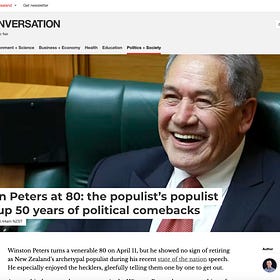I was pleased to be invited to review Jacinda Ardern’s recently launched memoir, A Different Kind of Power. The book review is now on The Conversation.
Some time back, I also reviewed Tony Blair’s On Leadership.
My post included a straw poll of readers, which received rather mixed feedback on Blair.
So let’s do a similar poll on Ardern.
There’s one technical point in Ardern’s memoir which needs to be clarified – but would have been too much pedantic detail for the review.
On the night of the 2017 election, Ardern acknowledged that her opponent, Bill English, had won more votes. She quotes her own speech, saying that the final outcome “won’t be decided by us. It will be decided by MMP” (page 194). This was misleading, strictly speaking.
MMP (mixed-member proportional) is the name given to the electoral system. In itself, it decides nothing. The voters decide collectively, by election, who will represent them.
Once the results are known, the elected representatives decide who’ll govern, and the Governor-General appoints as prime minister the leader who can validly claim that he/she has the majority support (or confidence) of the House.
If there’s any doubt as to who commands the confidence of the House (as was the case on election night 2017) negotiations should sort the matter out. On that occasion, NZ First’s leader Winston Peters was in a position to act as “kingmaker”, shuttling between both major parties. In effect, it looked as if Winston decided the final outcome, much to the annoyance of National supporters.
But have you ever wondered why Bill English failed to seal the deal with Winston? That’s now a question for historians, and there are differing versions. What if he had sealed the deal, and Ardern hadn’t become PM in 2017?
Ardern does at least give an insight into how it looked from her point of view, discovering via TV that she’d be PM, at the same time as the rest of us.
There’s another “what if” story which asks whether Labour might have lost the 2020 election had it not been for Covid-19. They were trailing National in the polls in late 2019 and in the first weeks of 2020. They received a major “rally round the flag” boost during 2020, although this was already waning by the time of the election.
Ardern lays claim to “a different kind of power” based on empathy and kindness. My reading of her memoir supports this up to a point, but also highlights its shortcomings. No political virtues work for all seasons. After all, why had Labour lost hundreds of thousands of voters by 2023?
Why Labour lost
Looking back at July 2020, the Labour Party was on a high. In a Newshub/Reid Research poll, support for Labour hit 61 percent and Jacinda Ardern was the preferred prime minister for 62 percent. Public confidence in the government’s pandemic response was strong. Compliance with lockdown (one of the strictest in the world) had been good, and the virus had…
To read more about political leaders and leadership:
Luxon and Hipkins: assessing their leadership capital
This post is a draft (but with some extra detail) of a finished article that’s appearing on The Conversation. Here I provide some more on the sources and leadership assessment I’ve used in relation to prime minister Luxon and leader of the opposition Hipkins.
Winston Peters turns 80
He’s older than Donald Trump and younger than Joe Biden. Is it time for Winston Peters to throw in the towel? Apparently it’s not, judging by his behaviour.
Better leaders. Yes. But what kind of leaders?
An earlier post on the Labour Party generated robust discussion, raising three topics: getting better leaders, understanding neoliberalism (and alternatives to neoliberalism), and changing the electoral system (again?)
Political Leaders and Leadership
As we approach the inauguration of Donald Trump for his second term in the White House, it’s timely to reflect on political leadership as a general issue.
Leading through polycrisis: can the centre hold?
Numerous readers of Politics Happens have commented that none of the political parties represents them anymore or that the left/right distinction no longer means anything.
Interview with Heather Du Plessis-Allan on Jacinda’s memoir.













If I only have 1 complaint about the Ardern Govt, it's not so much what it did but what it didn't do. On the 1 hand, it resisted the temptation to auto-golpe like Orban, Trump & Erdogan; on the other hand, it wasted a golden opportunity to implement a CGT and/or LVT.
Ardern swapped out a raft of not-very-radical Labour policies during the 2020 campaign for 'trust us we'll see you right' non-entity platitudes. Presumably she (or rather the neoliberal 'deep-state' of Treasury officials) thought Labour needed a free hand to do whatever was necessary to regulate the economic aftermath of the crisis.